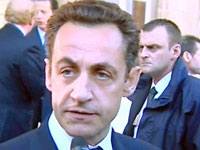France goes on strike
Nicolas Sarkozy's plans to trim special retirement packages for some workers caused strikes of transport employees in France. Strikes will start Wednesday night. Flights to and from France will be disrupted. It will also affect train routes in Europe and leave Paris virtually stripped of public transport.

The strikes, to last through Thursday, confront the popular president with his first real challenge since he took France's helm in May, and send him a clear message that deeper reforms could come at a cost.
The walkout is just one of the clouds forming over Sarkozy: The economy is lagging despite his pledges to invigorate it, signs of discord over his policies are cracking his party - and his rocky marriage is front-page news.
The president himself appeared unfazed, saying Tuesday night he would push through the reforms regardless of public protest because "That's what I was elected for."
A union leader, meanwhile, threatened even more strikes if the government did not negotiate on the retirement rights.
While France's strikes are legendary, the country has not had any serious ones since Sarkozy took office. This week's action could be the biggest in years.
Labor leaders hoped the walkout would recall 1995 strikes that paralyzed the country and sapped then-President Jacques Chirac's appetite for reform.
Sarkozy himself will be away Thursday at an EU summit in Portugal. But tens of millions of his compatriots will be struggling to get to work and school.
The Paris transport authority RATP said traffic would be "virtually nil" on most of its lines, and "nearly paralyzed" on the national rail network.
Eurostar trains to London and connections to neighboring European countries also would be disrupted.
Transit workers initiated the strikes, but employees of state-run electricity, gas and other services also could take part.
Most teachers were not planning to strike, but some schools were expected to close because of transport difficulties.
Air travel also faced potential disturbances, according to civil aviation authorities, who said there was a risk flights would be modified, particularly early in the day if administrative and airport personnel had trouble getting to work.
The strikes could overflow into Friday. Three train federations were calling for a daily vote on whether to extend the strikes.
The pension plans under threat, which cover workers at an array of different companies and institutions, were originally devised to give advantages to those in physically demanding jobs, such as miners and train drivers.
Workers covered by the special pensions are able to retire earlier and on more generous terms than the vast majority of the French working population.
Sarkozy, who pledged changes to France's labor protections during his election campaign earlier this year, deems the benefits too costly, outdated and unfair.
Labor Minister Xavier Bertrand said Wednesday that the reforms were "indispensable."
The head of the CGT union, Bernard Thibault, urged the government to start "real negotiation" over the retirement reform or face more strikes, according to an interview with Le Monde published Wednesday.
Meanwhile, Sarkozy is facing dissent within his own UMP party. UMP lawmakers are split over government plans for a DNA test for aspiring immigrants, and have bristled at hints he will open his government to more opposition Socialists.
The economic outlook offers little inspiration. Public deficits are widening even as forecasts for French growth shrink to 1.8 percent, less than the 2 percent to 2.5 percent the government had targeted.
And on the home front, a respected newsweekly reported Wednesday that Sarkozy and his wife, Cecilia, have informed a judge they are separating. The president's office would not comment on the report, which comes after weeks of rumors of a split.
Subscribe to Pravda.Ru Telegram channel, Facebook, RSS!


